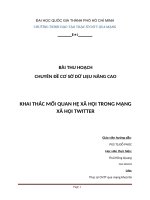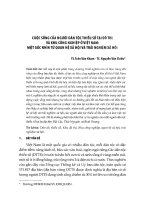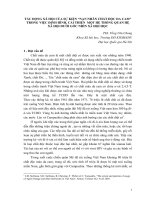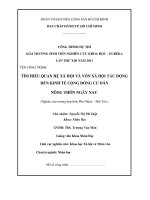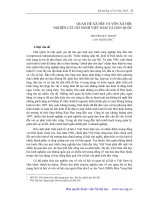Bơi ngược dòng các quan hệ xã hội và hoạt động sinh tồn trong nền kinh tế thị trường
Bạn đang xem bản rút gọn của tài liệu. Xem và tải ngay bản đầy đủ của tài liệu tại đây (550.41 KB, 18 trang )
VEPR Working Paper
WP-06
Swimming against the current:
Social relations and self-subsistence in the market economy
Tran Thu Ha
© 2010 Vietnam Centre for Economic and Policy Research
University of Economics and Business, Vietnam National University Hanoi
WP-06
Swimming against the current:
Social relations and self-subsistence in the market economy
Tran Thu Ha
1
Abstract
The market-centric development is driven on the belief that social orders can be
most efficiently achieved by individuals pursuing self-interest in a self-regulated
economy (Gill 1995: 55). This paper challenges this belief by contending that
individuals are not strictly self-interested and the self-regulated economy is
actually regulated by corporations instead of the state. In reaction to the dominant
narrow view of economic development, social struggles have taken the form of
everyday self-subsisting activities, altruistic and non-monetised reciprocity
behaviours driven by social relations, as well as international movements that aim
to transfer the market regulation power from corporations to small and medium-
sized farmers. These struggles suggest that alternative ways to development
besides the market mechanism are possible and, to many people, may prove better
than the current concentration of resources.
1
Graduated from sociological department at Dartmouth University, the United States, persuing the Master
program in Development Practice-Advanced at the Queensland University, Australia.
Email:
1
Content
Background................................................................................................................................2
Social relations in the economy.................................................................................................4
Self-subsistence in the economy................................................................................................7
Conclusion and policy implications.........................................................................................12
References................................................................................................................................14
2
Background
After the collapse of the Soviet bloc in the 1990s, neoliberalism has enjoyed impervious
domination all over the world (George 1999: 13). Liberalisation swiftly took place in most
countries under the belief that the self-regulating market offered improved well-being for all.
As neoliberalism expands, it crosses over the national boundaries and creates an increasingly
interlinked system, in which countries attempt to specialise based on comparative advantage.
Trade among countries has increased substantially over the past two decades with raw
materials, natural resources and cheap labour from developing countries and processed, high-
tech products from developed ones (Barndt 1997: 68). Trade has been further facilitated with
the emergence of the WTO, the NAFTA, the ASEAN, and other free trade zones, which
promise lower economic protection among member countries. Neoliberalism and the
resulting globalisation seem to be embraced by all corners of the world.
Neoliberalism is the re-emergence of classical economic theory, which was particularly
glorified during the Thatcher/Reagan administration and continues to live on until today
(Schuurman 1993: 95). The order of neoliberalism is created based on individual choices
made within structural constraints. The choices are driven by self-interest and argued to be
sufficient in creating an “efficient social order” if operated under “the facilitation of
spontaneous exchange processes and the effort to create […] a self-regulating market order
on a world scale” (Gill 1995: 55). In other words, social order could be optimally achieved
with individuals pursuing self-interests in a free, global market. Accordingly, competition and
free trade should be encouraged to maximise efficiency. The role of the state, as Hayek
argued, is simply to create the Rule of Law that protects and ensures the freedom to private
property (Gill 1995: 55).
As Vietnam transforms from central planning to the market economy, the spirit of
neoliberalism is increasingly evident in the country's policies, development projects as well
as research papers. Privatisation has taken place at a swift speed, gradually transfering the
regulation power from the state to the market, a supposedly more efficient mechanism.
Economic policies focus on individual and household interests rather than those of the
community as a whole. International trade has increased substantially as Vietnam joined trade
blocks, such as the ASEAN and the WTO. Domestic production has moved to a larger and
high-tech scale to meet the new competition associated with international integration.
3
In this paper, I would like to question the desirability of the neoliberal development model in
Vietnam by breaking down the key assumptions of neoliberalism and considering the
experience in other parts of the world. Despite many features that undeniably render
neoliberalism superior to central planning, the expansion of neoliberalism and globalisation
has led to puzzling paradoxes that not only ignite many movements among the losers in
economic liberalisation but also raise questions among the 'developed countries'. Inequality
has grown at a startling speed, where “the world's top 200 companies have twice the assets of
80 percent of the world's people” and the trickle-down effect that world leaders promised was
invisible compared to the rapid expansion of the corporations (Hawken 2000). “(O)ver 850
million people go to bed hungry in a world that produces more than enough food for all”
(Pimbert 2007). The environment is destroyed faster than ever before and disproves the belief
that the ‘tragedy of the common’ can be solved by privatisation (Hawken 2000). The list of
criticisms against globalisation and neoliberalism goes on and begs Vietnam to be more
prudent and skeptical when applying such a development model.
This paper challenges the key assumptions of the neoliberal model to demonstrate that the
social order driven by self-interests in a self-regulating market is imperfect and provide the
rationale for alternatives that react to these flaws. The alternative I will examine is economic
development based on social relations (alongside with self-interest) and self-subsistence
(alongside with trade). By exploring these alternatives, I am by no means suggesting that they
should replace neoliberalism, but rather, I aim to widen the 'imagination' of policy makers
and development practitioners that economic development can be achieved in diverse ways
other than via the self-regulating market. The paper first argues that the behaviours of human
beings are more than strictly self-interested because human interactions are not only market-
based but also driven by social relations, morality and cultural values. These social relations
reveal an ‘economy of generosity’ that exists alongside the market economy but has been
overlooked by mainstream economics (Graham 2001: 110). They protect the individuals from
market forces and create ‘cooperative advantage’, which strengthens the local against the
global (McMichael 2008: 220). The paper then argues that the market is not self-regulatory
but, rather, regulated by corporations through the manipulation of price. Given the unfair
nature of the competition, the paper suggests that trade is not the only means to development
and explores non-monetised, self-subsistence daily economic activities that protect the
individuals from market dependency while ensuring social and environmental harmony.
4
Social relations in the economy
Under neoliberalism, social relations are viewed as embedded within market relations
(Munck 2006: 179) and human beings are seen as either self-interested consumers, producers,
or labour (Smith 1986: 119). The belief that self-interest is the principal driver of behaviour is
particularly confirmed by the collapse of central planning in the late 1980s. In Vietnam, the
failure of the old cooperative system put in doubt the efficiency of cooperative efforts and
highlighted the importance of individual motivation in economic activities. Today, the market
economy thrives on the pursuit of self-interest and inadvertently downplays the importance of
cultural values, morality and personal relations as possible drivers of behaviours.
Yet the view of neoliberalism and communism, or self-interest and communal interest as a
binary denies the complicated nature of human interactions. Just as the old cooperative
system is flawed in solely relying on communal interests, the market mechanism is flawed in
focusing only on individual interests. In reality, the interests of human beings, rather than
standing on their own, are always intertwined with communal interests, moral orders, cultural
values, and even altruism. The best example is probably altruism within a household, where
the parents’ love for their children, spouses’ love for each other, brothers’ and sister’s love
put the other’s interests above their own. At a slightly larger relationship sphere, kinship and
friendship are also networks where the “logic of the market” does not dominate (Munck
2006: 179). Similarly, community relationships are based on the local cultural values, in
which the blind pursuit of self-interest may lead to social sanctions that cannot be measured
in money terms but are nevertheless painful to the violator. Finally, in our everyday life, there
are still random acts of kindness, such as helping strangers on the street without expecting
any kind of reciprocity. These behaviours exist even in corners where the market flourishes
the most. They reveal the fact that self-interests and communal interests, which are enabled
by social relations, should be viewed as a spectrum rather than a binary. The reliance on only
one end is unrealistic and fails to make use of advantages specific to each end.
In the economy, these social relations produce activities that do not contribute to GDP but
serve the immediate needs of those involved (Graham 2001: 80). Examples range from
students volunteering, a friend letting another stay at his/her place during travel, community
members helping each other prepare for feasts, take care of the ill, or simply exchange labour
during cultivation. Thus, instead of participating in the market and purchase these services,
the individual relies on the help of another person. These actions, while to some extent are
5
driven by reciprocity, cannot be measured by money terms because they challenge the
altruistic purpose of social relations; nevertheless, they are still productive, economic
activities.
A day of mine – Non-market interactions based on social relations
I woke up this morning at 7 am. I prepared breakfast for my family rather than eating
out (thus participating in the market and contributing to GDP). As a Vietnamese wife,
I tend to do a larger share of the housework because of the Confucius teaching on me
as a child. Hence, my husband and I developed a division of labour based partly on our
self-interest, but also on our cultural values and the love for each other.
As I drove to work, I stopped for an old woman to cross the road even though it meant
I would be late for work. I did so to be 'nice' because I was taught to respect the elder.
In a sense, this moral value synchronised my interest with that of the old woman
because it gave me a better feeling to be respectful to her than to be on time for work.
At work, my computer broke down and I asked one of my male colleagues to fix it
instead of calling our IT person because I was too lazy to go to a different floor. My
colleague still fixed it for me even though he was busy doing something else himself.
He did it because we have worked together for a long time and have supported each
other through many tasks. I was also older than him, thus, slightly more superior in a
social sense. Besides, being a male and supposedly better at technical issues, he felt
more inclined and responsible for the mishap.
In the evening, it was raining hard and the water started leaking into our house. Seeing
my husband and me struggling to patch up the roof, a neighbour offered us a hand. We
have developed good relations throughout the years not only because we have
supported each other during difficult times but also because we have shared stories,
gossips, jokes, which are not materialistic but benefited our spiritual well-being.
Getting help from our neighbour meant that our family chose not to participate in the
market (by hiring help), but it saved us money and built a stronger sense of solidarity
in the neighbourhood. Later on, we might ask the neighbour to have a meal with us to
thank him even though the money value of the meal might not be equal to the value of
hiring help.

